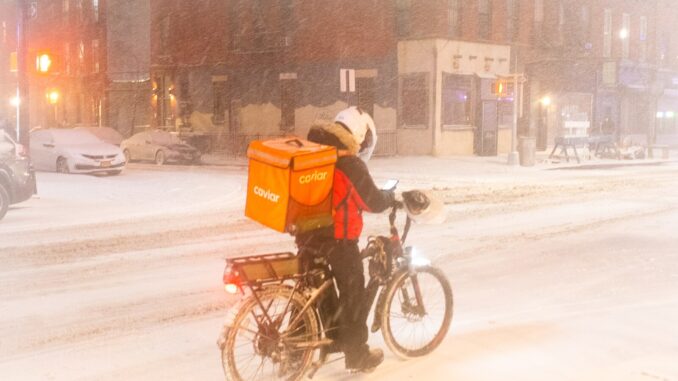
By: HAILEY COGNETTI
On a cold, snowy night in 2009, Gustavo Ajche walked miles through the frozen streets of Manhattan, with a food delivery in hand. That night, Ajche, an immigrant delivery worker, experienced harsh conditions he and countless others were enduring in the city.
Fast forward to 2020, when Ajche founded Los Deliveristas Unidos (LDU), one of the largest app-based worker collectives in the country. His experience in that snowstorm was just one example of the daily challenges delivery workers in New York City often face. According to Ajche, delivery workers go largely unrecognized for their essential labor. LDU, along with the Workers Justice Project (WJP) began bringing communities together to advocate for fair pay, and worker protections and to bring these workers’ issues into the spotlight.
Worker centers, like WJP, are community-based organizations for workers who are not a part of a union. Since app-based delivery workers in NYC are classified as independent contractors, deliveristas lack the bargaining rights that would allow them to unionize and negotiate for fair treatment. WJP specifically advocates for low-wage immigrant workers, particularly those in construction, domestic work, and app-based delivery jobs in NYC.
On Tuesday, Sept. 24 at CUNY School of Labor and Urban Studies (SLU) Sarah Watson, Director of SLU, moderated a discussion with Ajche and Ligia Guallpa, Executive Director of WJP, about their efforts to transform the future for NYC’s 62,000 app-based delivery workers.
“I still remember the first march that we organized to make these demands, we organized it in less than a week and saw more than 800 deliveristas show up at our first rally,” Ajche said in Spanish to the audience, his words translated by Guallpa.
Guallpa has been a key figure in organizing deliveristas and fighting for their rights. Under her leadership, she says, WJP has become one of the most effective worker centers in the country, with the goal of empowering workers and setting a national precedent for gig workers’ rights. She also made sure to credit “the real heroes. The real people that make this movement happen are actually the deliveristas.”
“Understanding what it really means to be a gig worker as an immigrant, undocumented, working in the industry that already lacks protections, that’s where my organization journey started,” Guallpa shared to the audience.
She explained that many delivery workers couldn’t understand when or how they were getting paid. The delivery workers WJP and LDU advocate for are often employed by big tech companies like Doordash, Uber Eats, Grubhub, and Postmates. Guallpa said at the event that these major companies withhold vital information that often leave workers powerless. Often they were paid as little as $5-7 an hour.
Guallpa recalled how the pandemic exposed the vulnerability of delivery workers. “It was the deliveristas who were out there risking their lives, making sure everybody gets their groceries, their food when everybody had to stay in,” she said.
But with the formation of LDU, delivery workers finally had a collective voice.
LDU’s most significant success came this year on April 1st, when they secured a landmark policy announced by Mayor Eric Adams’ administration mandating a minimum wage of $19.56 an hour, excluding tips, for delivery workers in NYC. But the fight for delivery workers protections isn’t over. Guallpa has continued to work with the U.S. Senate Majority Leader Chuck Schumer, Mayor Eric Adams, and other elected officials to launch “Deliveristas Hubs,” which would establish charging stations and rest hubs across the city to meet the needs of delivery workers.
“We have 77% of those 62,000 (deliveristas) riding on e-bikes, and the biggest issues that the deliveristas are experiencing is that while they’re trying to deliver food they don’t have places to park the bike, and no place to charge their e-batteries,” Guallpa said.
As the conversation came to a close, Guallpa and Ajche reminded the audience that despite the challenges workers’ still face, their movement is gaining momentum. Multiple city council members are on record showing their support for LDU, including NYC Comptroller Brad Lander, Public Advocate Jumaane Williams, and council members Majorie Velezquez (CD13), Carlina Rivera (CD2), and Justin Brannan (CD43).
